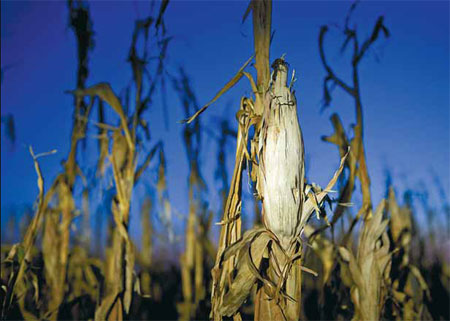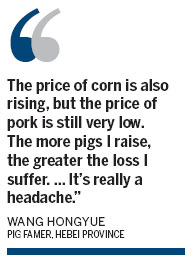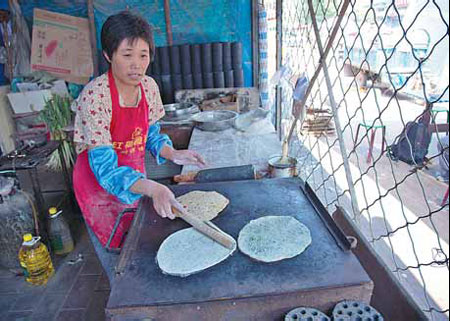|
|
|
 |
|
Corn stalks, severely damaged by a widespread drought, at a farm near Oakland City, Indiana, on Aug 15. Record temperatures in US farming states have hampered crop production and will likely send corn and soybean prices to record highs, according to the Department of Agriculture. Saul Loeb / AFP |
Extreme weather across the globe is recipe for surging food prices, reports He Na in Beijing.
Shi Hongmin has been panic buying recently. Two enormous bottles of cooking oil and two 25-kg sacks of flour are just some of his purchases.
The Beijing resident, 61, is reacting to news that global grain output will decline as a result of a severe drought in the United States and excessive worm damage to crops in a number of regions in China.
The 3-square-meter kitchen in Shi's family apartment is too small to store all the goods he's bought so he's started piling them up in the corridor.
Conditions are getting increasingly cramped for the five people living in the crowded 50-sq-m apartment.
Drought has gripped around 85 percent of US corn-growing farmland. More than 80 percent of land devoted to growing soybeans and about 70 percent of land in cattle-raising areas have also been hit by drought, according to the US Department of Agriculture. Nearly half of the corn and soybean-producing areas are experiencing levels of drought classified as extreme or exceptional.

This has resulted in lower yields and earlier harvests. The drought is the most severe to hit the world's largest producer of grain and meat since 1988.
Besides the US, a number of major grain-producing nations - Russia, India, Ukraine, and Kazakhstan - have also been plagued by appalling weather. Russia, the world's largest wheat exporter, is facing a decline in farmland of 4.4 million hectares, while the Ukrainian Ministry of Agriculture has said that the country's annual grain yield will decline by 20 percent from last year.
"Experience tells me that the price of grain will rise, so I am saving money," said Shi. However, sadly for him, his foresight hasn't won him any praise from his son and daughter-in-law.
"My wife and I often eat out, and my son is only 26 months old, so we really don't need to store so much food. My parents once stored too much rice, and the bugs crawled everywhere," complained Shi's son, Liang.
"My son only contributes 1,000 yuan ($157) a month to cover the cost of the family's food. If I didn't budget carefully, how could such a small amount of money stretch far enough? I am not joking: Every day I expect to see the price increases that will prove I was right," said the Shanxi province native, who moved to the capital with his wife to help take care of their grandson.
Despite the family criticism, Shi's prediction may be correct. On Aug 21, cooking oil suppliers handed in a request for higher prices for the product to the Wu Mart Group, according to Guo Yang, director of the public relations department at the retail chain store operator in Beijing. The producers say that the price of the raw material is surging because of the drought in the US.
"It's the first time suppliers have banded together to request a price increase, so it could well be that the US drought has started to affect the Chinese market," said Guo.
"I know they've also made the same request to other retailers. We still have oil in reserve, so we will wait. But if other retailers agree to raise prices, we will do the same," she said.
Hao Xueyong, cereal and cooking oil purchasing director of the Beiguo Supermarket outlet in Shijiazhuang, Hebei province - owner of the province's largest chain store operator - confirmed that the price of cooking oil is rising.
"The price of domestic oils have risen twice since the beginning of the year. Peanut oil has risen by more than 10 percent and other oils have also registered rises, although less drastic."
"Luhua" brand peanut oil currently costs 143 yuan per 5 liters, but in early July it was 132 yuan, and in January it was around 100, he said.
International connections
|
 |
|
A cook in a small roadside restaurant in Sanhe, Hebei province, makes a traditional Hebei dish. Droughts have affected some of the world's largest grain-producing countries, leading to a decline in output and a rise in the price of cereal crops. China has so far managed to maintain steady cereal food prices as a result of its large volume of reserves, drawn from bumper harvests over recent years. D.J.Clark / for China Daily |
Li Guofen, a farmer in Jixi, Heilongjiang province, may not care about or even have heard of Brownsburg in the US state of Indiana, she just wishes that she had more hands on board to help tackle the worms afflicting her cornfield. However, farmers in Brownsburg are also concerned about their yields as the drought withers their corn and soybean seedlings.
But these farmers, separated by thousands of kilometers, are jointly affecting the world grain price.
"China's increasing connection with the world means that fluctuations in the global grain price will inevitably affect our domestic market, especially as the volume of China's cereal imports keeps increasing," said Li Guoxiang, a researcher at the rural development institute of the Chinese Academy of Social Sciences.
International grain prices have soared since June and the price of corn has risen by a staggering 50 percent. The prices of soybeans and wheat also rose by about 30 percent, according to the People's Daily newspaper.
In Shandong province, the price of imported soybeans was 3,700 yuan per metric ton at the start of the year. By May that figure had risen to 4,200 yuan and on Aug 1 it soared to 4,700 yuan. The corn price is surging as well.
"As the world's largest grain exporter, the decline in US output will greatly affect countries that rely on grain imports. China will not be exempt, but the impact will be very limited," said Li from CASS. "So far, the majority of our cereal crop volumes are better than last year and another bumper harvest is expected."
Droughts in the US and Russia have resulted in a surge in the prices of major cereals, said Xie Jianmin, deputy director-general of the international cooperation department at the Ministry of Agriculture, but he added that the situation is not as serious as in 2007-08, when a global food crisis forced millions into food poverty. Meanwhile, China National Radio suggested that speculation can't be ruled out as a factor in the price rises.
"China's long-standing self-sufficiency in cereals after eight consecutive years of record harvests and the large volumes in storage guarantee that the impact will be slight," said Li. But he also warned that the country's reliance on soybean imports could be a cause for concern, because 30 to 40 percent of soybean imports come from US.
Chen Xiwen, director of the leading group on rural work at the Communist Party of China's Central Committee, predicted that soybean output in China will be roughly 13 million metric tons this year, while imports will amount to 55 million. The import volume was 52.64 million metric tons in 2011, and 54.8 million the year before. Meanwhile, China's soybean self-sufficiency rate has now fallen below 20 percent.
Soybeans to corn powder
General food prices rose in each of the five consecutive weeks running up to Aug 13 to 19, according to the commerce ministry. The price of eggs rose by 1.3 percent from the previous week, pork was up by 0.6 percent, and the prices of cereals and oils also rose.
Xinhua News Agency's monitoring system for domestic food prices shows that the price of eggs has risen rapidly since late July. By Aug 25, the price had risen by 15 percent from July 20, and currently exceeds 10 yuan per kg in more than 60 percent of provinces and cities. Prices in other areas are more than 9.4 yuan per kg on average.
Animal feed made from soybeans is the main food source for poultry and livestock. Wang Hongyue, a farmer from Cangzhou, Hebei province, who raises more than 30 pigs, said the price of bean pulp has risen recently and he has now reduced the amount he uses in animal feed, replacing it with corn powder to save money.
"The price of corn is also rising, but the price of pork is still very low. The more pigs I raise, the greater the loss I suffer. It's really a headache," he said.
"The corn price increased to 2,400 yuan recently from 2,300 yuan a metric ton in July," said Liu Xin, manager of the Yushu branch of Dalian Northern International Grain Logistics Co. "As the US drought continues to expand, I think the price may rise, but the room for increase is limited."
The harvest season is near and the market is changing every day. No one wants to take the risk of storing large amounts - price reversals, the high cost of storage and interest rates could easily drive an enterprise into bankruptcy, he said.
Li Hongquan, who owns a chicken farm in Liaoning province, is of the same opinion. "Bean pulp costs 4,050 yuan per metric ton, but this time last year it was only 3,000 yuan. The price hikes have eaten away most of my profit," he said.
Indispensable foodstuffs
The surging price of meat, eggs and milk has also troubled Qin Fu, director of the institute of agricultural economics and development at the Chinese Academy of Agricultural Sciences. "They are indispensable foodstuffs on ordinary people's tables. The central government should increase soybean imports in the short term to avoid price fluctuations. But in the long run, we need to find more substitutes and improve the variety of cereal plants to gradually eradicate an excessive dependence on the international market. It's worth researching," he said.
Li Guoxiang wasn't convinced that increasing import levels would be a good solution to the problem and suggested that the authorities should wait before implementing such a move. He believed that the price hike in cereals may have been caused largely by speculators using natural disasters to manipulate the market.
"The failure in grain output is still at a predictive phase generally and the full market impact may not be seen for several months," he said, "Severe measures should be taken against people who are forcing prices higher."
He also suggested that the government could offer subsidies to help those on low incomes and farmers whose crops have been ravaged by pests.
Zhang Guijin, deputy director of Siping National Grain Depot in Jilin province - directly managed by the State Council - said the depot hasn't received orders to increase storage or raise the amount distributed to reduce price fluctuations. "As far as I can recall, the country has only once ordered an increase in temporary grain storage. That was in 2008, during the global food crisis," he said.
"The impact of the US drought on China will be very slight, so people don't need to worry."
Contact the reporter at [email protected]
Han Junhong contributed to this story.